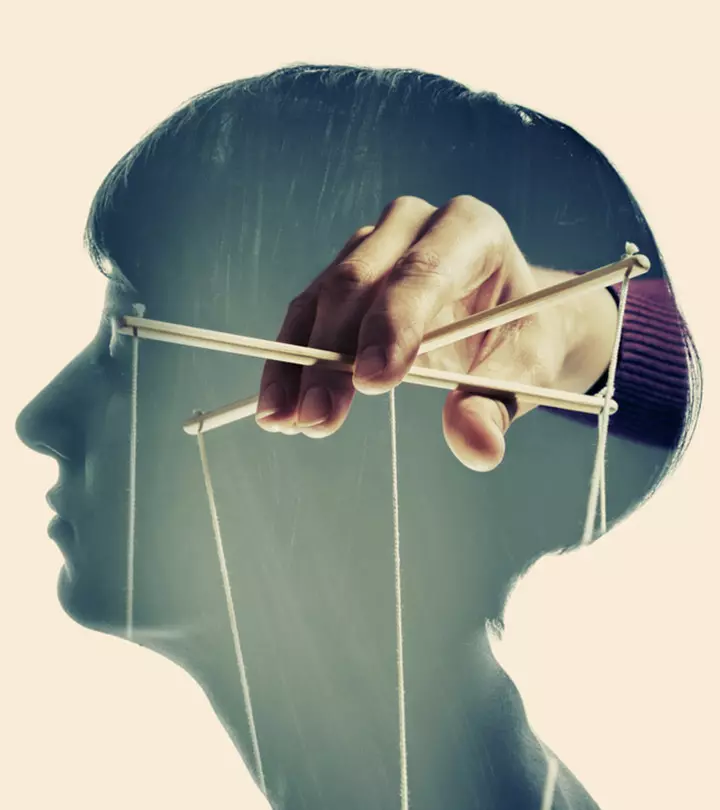23 Signs Of An Unhealthy Relationship You Should Know About
Be aware of the toxic traits to decide when it's time to step out of the relationship

Image: Shutterstock
Love is considered one of the purest feelings in life. It has been romanticized in pop culture and vintage movies. Yet, study shows the prevalence of abusive relationships among people of all ages, especially youngsters (1). The signs of an unhealthy relationship should not be overlooked. It is not healthy if your relationship is not based on trust, love, and commitment.
Therefore, you should be careful when you spot any red flags in your relationship. It may not be easy to spot these signs as they could be quite subtle. Often, you do not even notice such signs. We are here to help you. We have listed 23 signs to help you check if your relationship is healthy or unhealthy. Keep reading.
In This Article
23 Signs Of An Unhealthy Relationship
1. Disrespect
If your partner does not hold your opinion equal to theirs, dismisses it, and refuses to discuss it because they feel they know better, it is a sign of an unhealthy relationship. This can involve cutting you off as you speak, laughing away your opinions, or simply ignoring them and talking over you. People often excuse this. But take note of it if it is happening too frequently and is hurting you emotionally. You must express your true feelings, often overlooked for the sake of not spoiling the status quo of your relationship. Your emotional happiness is important too.
2. Control
One of the most significant signs that a relationship may not be working is when one partner completely takes over, subtly or obviously attempting to control how the other partner leads their life. You need to take things seriously if everything about you, right from your clothes, to what you watch, who you speak to, and even what you say are being dictated by your partner (2).
3. Reward-Punishment System
Whenever you behave as per your partner’s wishes, you can expect to be showered with love and affection. Step out of the line, and they will start being rude. This promotes an unhealthy standard for a relationship and gives unfair power to one party (2). Certain individuals on relationship forums have connected this system to dogs’ Pavlovian training (where dogs are trained with repetitive actions to give reflex responses). A relationship should be encouraging, supportive, and interdependent, allowing you both space to be who you want and choose to be.
4. Jealousy
Whenever you hang out with other people, speak to friends and acquaintances, your partner may get angry or unhappy. This is the definition of a jealous partner and could be a warning sign. If you see them becoming increasingly upset about how you spend your time and who you spend it with, it is time to nip this behavior in the bud or reevaluate the relationship (3).
5. Possessiveness
The thought of you not focusing on them every moment of the day is unbearable to your partner. They are possessive not just of your time but also of your attention and effort. Anything not directed towards them is essentially “wasted effort” in their eyes. A toxic partner will do everything they can to keep your eyes on them and them only – and this is a sign of an unhealthy relationship.
 Quick tip
Quick tip6. Extreme Mood Swings
Mood swings are actually a widespread phenomenon in an unhealthy relationship. Quite like a child, your partner is used to having your time and attention all the time. When you are occupied, they may attempt to regain your attention by demonstrating extreme mood swings – and these can grow in intensity and duration the longer you take to respond to them favorably.
7. Unsuccessful Communication
Healthy communication is what goes out the window first when a relationship is deteriorating. You will notice that your partner does not pay attention to your needs and wants and does not seem willing to improve their behavior. All attempts to speak to them go in vain (4)
8. Isolation
To ensure that they keep controlling you as per their wishes, a partner may try to isolate you from friends, family, and other people. These people may convince you to rethink things and realize that your relationship is not working out anymore. This may threaten your partner, and they can attempt to isolate you from the people you love and cherish the most, and who can influence you.
9. Sabotage
Are you proud of a particular accomplishment? Well, not when your partner is around you. You can often see them attempting to sabotage your achievements and dominating you with a discussion of their accomplishments. In this case, your partner intends to keep you influenced enough that you never outshine them in any aspect. It is not only a narcissistic behavior but also a serious warning sign to exit the relationship if you are unable to express who you truly are.
10. Dishonesty
One of the more prominent signs of an unhealthy relationship is that your partner may not be hundred percent honest with you. They may lie, cheat, omit, deceive and do anything else they can to ensure that your only point of reference is what they would like you to believe. This helps them maintain control over you, isolate you further, and tip the scales of power in their favor.
Honesty is the foundation and first step to building respect and trust, which has to be earned.
Sydney Armstrong, a blogger, shared her experience with an unhealthy relationship. Her partner hid his phone from her and made excuses for his behavior. She wrote, “My boyfriend told me that the reason he slept with his phone under his pillow was so that he could “hear his alarm better in the morning”….. I’m sorry but was I born yesterday?!? How did I believe that? I believed an absolutely idiotic excuse while in reality I was being cheated on for three months (i).”
11. Guilt Tripping
Another prominent sign that you are in an unhealthy relationship is that you can have no joys that are your own. If you attempt to celebrate or do anything without your partner, they may make you feel guilty for your actions (5).
12. Gaslighting
Gaslighting involves invalidating the victim’s trauma and experiences and making them believe they are insane or crazy for having the concerns they do. This can include belittling, dismissal, re-explaining the same events to suit their perspective, and more. Gaslighting is often subtle and missed by those who are not well versed with the concept (6). If your voice is not being heard or you are not being listened to, the same theme will continue.
13. Rushing Things
All good things take time to happen, especially a relationship you want to work on, for it to thrive. But one subtle sign that you are in a bad relationship arises before even the relationship starts. Your partner can be quick to test and bend your boundaries to see what they can rush and what you will not relent for. As a result, you may end up accidentally agreeing to terms or a situation you are not wholly comfortable with. Experts recommend a waiting period of at least four-six months to get a reasonable understanding of your partner, their values, and how they communicate and treat you. Take time to get to know someone. If they want you in their life, they will respect how long you want to date them for.
14. Narcissism
Them, them, them – that is all you hear always. If you cannot even listen to yourself talk over the sound of your partner speaking, take it as a warning. Narcissistic partners will always place their well-being above yours and refuse to compromise on their value systems. They instead demand you be the one who changes. It is one of the more noticeable signs that you are in an unhealthy relationship (7).
15. Physical Violence
Physical violence is a critical sign to exit your relationship. If a partner threatens to hurt you or actually attempts to harm you, it is a clear sign that you are in an unhealthy relationship. This can also be potentially dangerous to your immediate well-being – please seek resources if you need help (8). Another means of expressing physical violence is destroying the items that you love, breaking things, cursing and threatening to hurt you, or even hurting themselves in an attempt to gain your sympathy using emotional blackmail. They might promise to change and apologize, until the next time. Always consider your safety first.
16. Intimidation
Sure, they might not hurt you physically. But that does not mean they are not leaving an emotional wound or mark behind. If they threaten you with consequences for something you plan on doing, it is a significant warning sign. Intimidation can be as apparent as stating it plainly, or as subtle as making you believe that they are not intimidating you at all (8). If this is a consistent pattern with your partner, it is better to avoid them at all costs. This not only minimizes your contact time but also helps you evade any threats they could make.
17. Sexual Violence
Sexual violence is an extreme sign that you are in an unhealthy relationship. If there is any sexual activity between you and your partner without your active, enthusiastic consent, you may be a victim of sexual violence. It is recommended that you report this to the authorities immediately and distance yourself from your partner (8). Sexual violence is a grave offense in most countries, and it is recommended that you resort to assistance as soon as possible.
18. Infantilism
Infantilism refers to the act of treating you like a child. This is a subtle sign of an unhealthy relationship that could be easily overlooked. They do not give your opinion much importance, dismiss it as uninformed or ill-suited to the discussion, and make you believe that you are not qualified to discuss anything with them. However, this is not thoroughly researched in terms of dating and still holds a lot of weight on discussion forums. People have discussed their unsatisfactory experiences with a partner who infantilizes them.
 Pro tip
Pro tip19. Belittling
This is a little different than infantilism. To criticize you, your partner will take apart your argument word by word and do their best to demonstrate all the mistakes in your comments. They will continue to make you wrong and will not take accountability for their own wrongdoing. This is a subtle, long-term form of verbal abuse that is a relationship warning sign to keep an eye out for. If nothing changes, you have your answer to make a healthier relationship choice.
20. Emotional Upset
Do you feel like dating your partner is an emotional rollercoaster if they appear needy? You feel unsure or more often upset, and you feel you are treading on eggshells because whatever you say, even with good intention, is received negatively. If so, it could be a sign of an unhealthy relationship. Both of you will need to address the situation if you share similar relationship values and want to work on your relationship together. You will need to be patient and question why your partner feels insecure, or what they need from you for them to feel more secure in your relationship. A healthy relationship involves give and take, so be patient. Discuss the issues. A relationship doesn’t arrive pre-packaged. You have to work on it together as a team.
21. Ill Intentions
You can easily detect the first sign a relationship is not working by going back to your roots. Why did they start dating you in the first place? What was it about you that they liked? If the answers seem superficial with little to no thought given to them, you might want to reevaluate your relationship. Many people enter relationships for selfish reasons, including emotional gain, monetary purposes or to exert control. Before you become serious about that special someone, it is essential to determine that their intentions are in the right place, you share important relationship values (e.g. trust, honesty, respect, family, having fun), and you want to work towards the same future. For instance, if you both want a family or want to support each other’s goals, allow space for your individual friends and interests.
22. Hostility
Hostility may look like constant arguing, criticism, resentment, and verbal attacks that can chip away at the trust and intimacy in a relationship. A healthy relationship should be a safe space that fosters growth through effective and living communication. This toxic trait and a general lack of empathy can be indicative of a hostile and unhealthy dynamic between the partners.
23. Harassment
Harassment can manifest as constant monitoring, verbal bullying, and insults. These behaviors can rob the partner of privacy, mental peace, and safety. It can cripple a person’s sense of independence and freedom and erode their self-esteem, replacing it with fear and isolation. It is essential to seek professional help and recognize and address any form of harassment to establish healthy boundaries and communication patterns.
Unconditional love is possible for individuals who have worked on their self-development openly and are willing to accept, without conditions, a partner with a healthy foundation in place. It’s your responsibility to prioritize working on what makes you happy, your health, and wellness above everything else. So, don’t overlook the signs of an unhealthy relationship to avoid hurt, trouble, and pain down the line. For instance, one should not tolerate disrespect, dishonesty, isolation, narcissism, intimidation, violence, gaslighting, and other destructive behaviors. You should also distance yourself if you feel emotionally exhausted, or if every interaction feels like hard work. Excessive jealousy, possessiveness, and lack of open communication between you and your partner are signs of an unhealthy relationship. If you notice any of these signs, it is time to reevaluate your relationship.
Frequently Asked Questions
Can unhealthy relationships change?
Yes, unhealthy relationships can change if the couple is equally committed to making their relationship work. There must be utmost honesty, communication, and self-reflection for an unhealthy relationship to transform into a beautiful and fulfilling relationship. The couple may also seek professional help to build a healthy relationship.
Why do people stay in unhealthy relationships?
Multiple factors may make people stay in unhealthy relationships. Codependency can be a significant reason. If someone is entirely dependent on the partner financially and emotionally, they may find it safer to stick to the relationship. At the same time, to avoid social scrutiny, some people end up staying in such relationships.
Key Takeaways
- Consider your relationship to be unhealthy if it is not based on honesty, trust, respect, love, and both parties are not willing to work towards a healthy relationship.
- Respect has to be earned, which takes time before you both decide to commit to your next serious step together.
- As a result, be cautious if you notice any red flags early into your dating relationship. Before you become serious with that special someone, you need to ensure their intentions are genuine and their style of communication is healthy.
- After you’ve realized something isn’t right, talk to your partner about it. If that doesn’t work, and you recognize you have the foundations of a healthy relationship to work on, there are other options for saving or strengthening your relationship.
Watch this eye-opening video that details the signs indicating an unhealthy relationship. Explore 12 key signs and arm yourself with the information you need to identify and resolve potential problems.
Personal Experience: Source
StyleCraze's articles are interwoven with authentic personal narratives that provide depth and resonance to our content. Below are the sources of the personal accounts referenced in this article.
(i) FIVE SIGNS YOUR RELATIONSHIP IS UNHEALTHYhttps://notjustafeministkilljoy.wordpress.com/2016/05/21/38/
References
Articles on StyleCraze are backed by verified information from peer-reviewed and academic research papers, reputed organizations, research institutions, and medical associations to ensure accuracy and relevance. Read our editorial policy to learn more.
- Everyone knows someone in an unhealthy relationship’: young people’s talk about intimate heterosexual relationships in England:,
https://www.researchgate.net/publication/343739809_’Everyone_knows_someone_in_an_unhealthy_relationship’_young_people’s_talk_about_intimate_heterosexual_relationships_in_England - Associations among Aspects of Interpersonal Power and Relationship Functioning in Adolescent Romantic Couples,
https://www.ncbi.nlm.nih.gov/pmc/articles/PMC2529377/ - A Systematic Review of Romantic Jealousy in Relationships,
https://www.researchgate.net/publication/319306102_A_systematic_review_of_romantic_jealousy_in_relationships - Does Couples’ Communication Predict Marital Satisfaction, or Does Marital Satisfaction Predict Communication?,
https://www.ncbi.nlm.nih.gov/pmc/articles/PMC4852543/ - A Qualitative Investigation of a Guilt Trip,
https://carleton.ca/cognitivescience/wp-content/uploads/Humeny.pdf - The Sociology of Gaslighting,
https://journals.sagepub.com/doi/10.1177/0003122419874843 - Narcissism and Romantic Relationships: The Differential Impact of Narcissistic Admiration and Rivalry,
https://www.researchgate.net/publication/305281174_Narcissism_and_Romantic_Relationships_The_Differential_Impact_of_Narcissistic_Admiration_and_Rivalry - Abuse in Intimate Relationships: Defining the Multiple Dimensions and Terms,
https://mainweb-v.musc.edu/vawprevention/research/defining.shtml
Read full bio of Karen Marshall
Read full bio of Shivani Chandel
Read full bio of Shatabdi Bhattacharya
Read full bio of Sneha Tete






























Community Experiences
Join the conversation and become a part of our empowering community! Share your stories, experiences, and insights to connect with other beauty, lifestyle, and health enthusiasts.